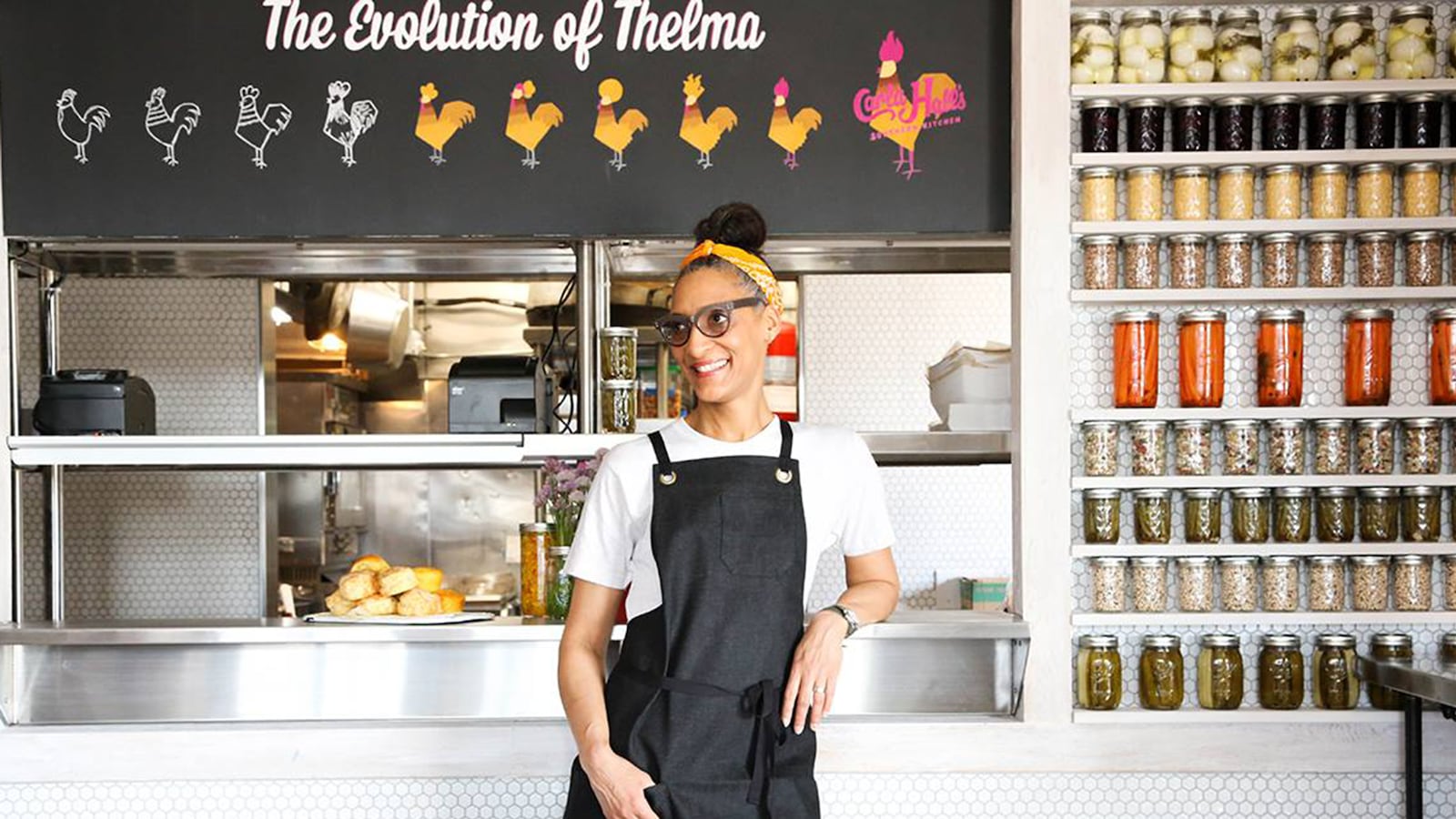Some chefs are strict about measuring ingredients, others not so much. Which camp do you fall into? “I’m more of an intuitive cook. Interestingly, I probably don’t even follow my own recipes, but you have to have a jumping-off point and I want to honor the ingredients. I think bread bakers do this the best, especially a bread maker who is using actual fire and wood to make bread. They have an idea of what they want to do, but you can’t really control the wood, the fire, the temperature and the humidity. There are so many unknowns. They basically are like okay, it is what it’s supposed to be today. I think that’s the kind of cook I am.”
Apron or no apron? “Apron.”
Always? “No. In the restaurant Carla Hall’s Southern Kitchen, I’m in and out. At home, I don’t wear aprons. Also, if I do a cooking demo, no chef’s coat. Because I want to be relatable to the people who I think really want my expertise. And I don’t want to come across as somebody above who they are.”
My dad usually asks for salt and pepper in restaurants. Does that request bother you? “He’ll be jacked up at my table because I’ve already seasoned it. No need.”
What’s the hardest part of soul food to master? “I think it’s the long simmer. I am from Nashville, so I feel like I grew up with this food. I think the hardest thing for me is to try to convey this to somebody else who isn’t from the south or even out west. I think the misnomer is that all soul food comes from the south. It doesn’t. We have New Orleans, which is its own thing, but you also have up north, you have out west. You have different types of soul food.”
And different influences in each area. “Exactly. Because blacks were cooking for everybody, those influences sort of changed the food that they made. Trying to tell somebody how to make soul food is like trying to tell somebody how to dance and how to feel the beat. I can’t really tell you. All I can do is have you cook, experience the culture and then find that beat within yourself.”
The long simmer is tough for me. I’m tempted to keep checking on the dish. “You have to let it go. I think you have to understand the end game. Let’s say you’re doing greens. You can’t put all your salt and everything in in the beginning because it’s going to reduce and because it’s going to be salty at the end. You have to think like chess. Think four or five moves down the way.”
Is the long simmer harder to master than fried chicken? “Well, fried chicken is a whole other thing. I think people over think it. I think there are a lot of people who over think fried chicken by saying, oh, let me do buttermilk, let me do double dreg, let me do this, let me do that. They are intellectualizing the fried chicken. Because all my grandmother did was put some seasoning on it, dropped the chicken in a bag with seasoned flour and shake, shake, shake and into a pan. It was the best friend chicken. That’s how I do it now, but when I first opened my restaurant, I was like I’m going to do brine, let me make sure it’s seasoned and all this. I was like this is not working, plus we didn’t have the space to do that. Now I said I really want to get back to just doing it like my grandmother did it. I do a seasoning blend, I toss it in that. That same seasoning blend goes in the flour. I toss the chicken one time. I do the seasoning 15 minutes before. It’s not like it’s hanging out. So, 15 minutes before the seasoning goes in, then it goes into the flour. Immediately it goes into our low-pressure fryers. And it is juicy and seasoned.”
Are you picky about the oil you use? “I am. We use a rice bran oil. Rice bran because we’re a nut-free facility, so no peanut oil. Also, the rice bran fries really clean. And because we do hot chicken, so we’re going to toss it in that oil. We needed an oil that’s not going to be absorbed. I’m pretty happy with it.”
How long did it take you to master your fried chicken? “A long time.”
Is the recipe done? “I think it’s done now. I’m not going to mess with it. I like our seasoning blend. There’s nothing more satisfying than to watch somebody who is eating our chicken at the restaurant and there is juice that’s just dripping from the chicken. But it did take me a while because quite frankly I don’t fry chicken at home. I don’t want my house smelling like grease and chicken. You know? Chicken is a thing you go out to eat. It’s too messy. Let me come to your house and make corned beef and cabbage.”
Do you work fairly clean when you cook? “I’m going to out myself. It depends. If I’m doing a recipe I know, I’m clean. But I’m not anal. It’s not like I work at Le Bernardin. If I’m creating, doing something for a cookbook, I have things out. My creative process is a bit sporadic.”
Is there one dish at your restaurant you’re most proud of? “I’m proud of our collard greens. And I say that because I think most people think they should be made with a lot of pork. All of our sides are vegetarian.”
Was it a surprise how well your TV show, The Chew, has done? “I think the thing that surprised us all was that we got along so well. And we’re all so different. This is Mario’s analogy: We wouldn’t have chosen to be roommates, but we get along really well.”
Carla Hall is the owner of Carla Hall’s Southern Kitchen, in Brooklyn, and can be seen daily on ABC’s Emmy Award—winning The Chew.
Interview has been condensed and edited.





